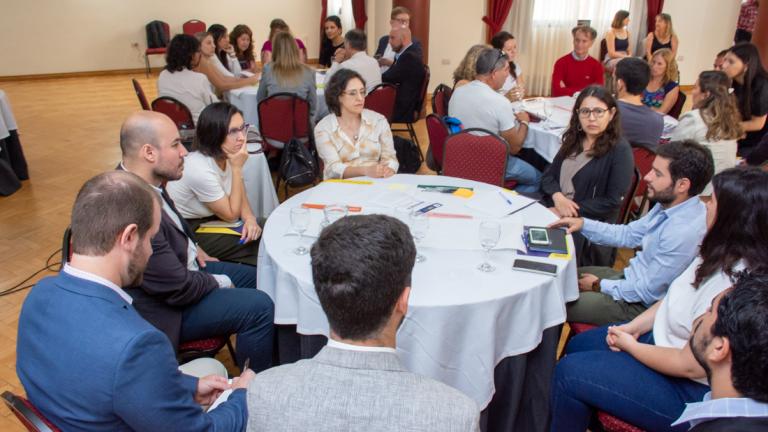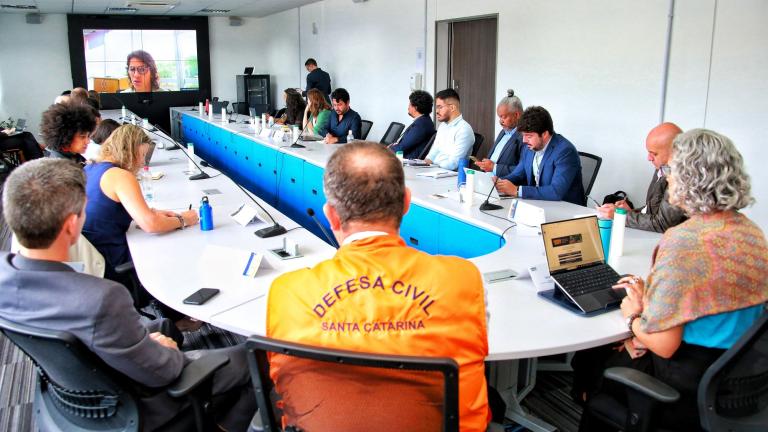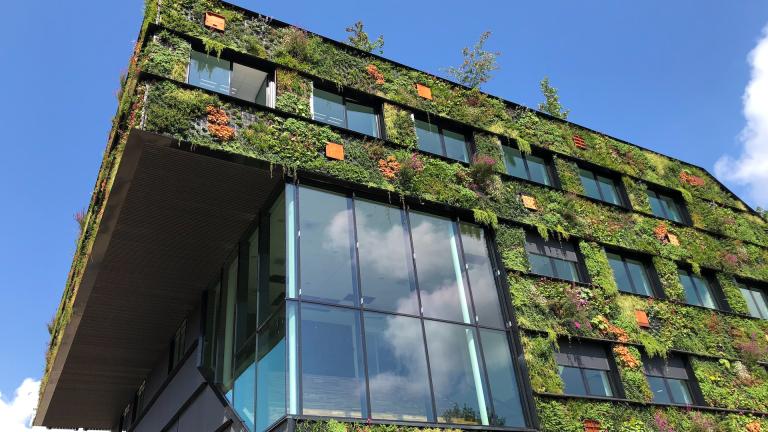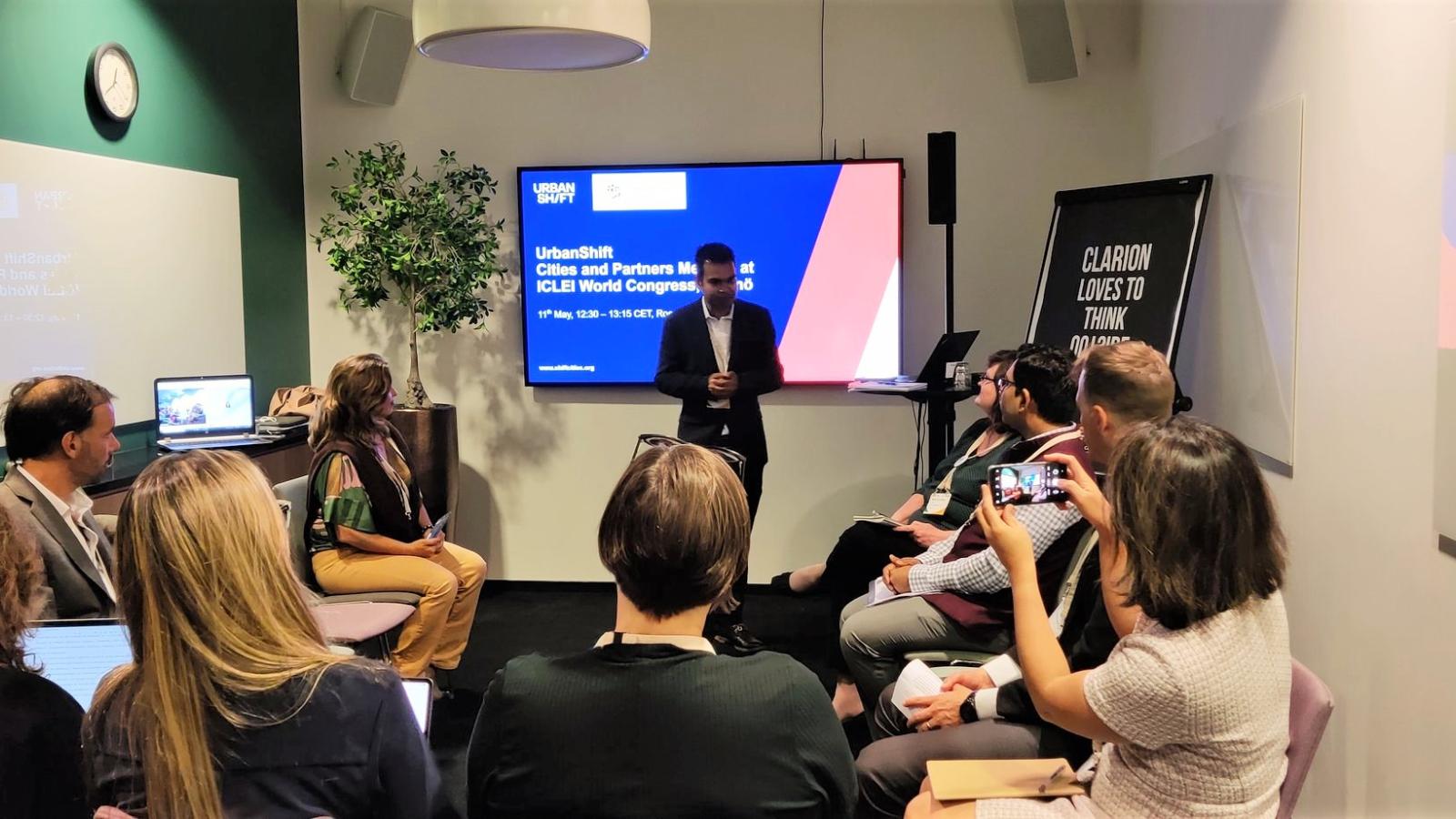Recap
URBANSHIFT CITIES CONNECT IN MALMÖ
Cities from Asia, Africa and Latin America exchanged knowledge about integrated sustainable urban development at UrbanShift's first global in-person advocacy event and learned first hand from the experiences of host city Malmö, Sweden.
UrbanShift's ICLEI Project Manager Nazmul Huq presenting at a session during the ICLEI World Congress
Representatives of Pune (India), Buenos Aires (Argentina) and Freetown (Sierra Leone) – UrbanShift (GEF-7) project cities – and the Mayor of Recife, Brazil (GEF-6 city) met in-person between May 11-13, 2022 in Malmö, Sweden for the ICLEI World Congress 2021-2022: The Malmö Summit. The Congress was the first UrbanShift global opportunity for GEF-supported cities from different regions could meet, learn and exchange about integrated sustainable urban development among themselves and with Malmö, Sweden – host of the Congress and the local study tours.
The City of Malmö, a once successful industrial city that fell on hard times, has since reinvented itself as a dynamic knowledge centre built on cultural diversity, youth engagement and sustainable development. Malmö simultaneously focuses on climate action and social equity issues through a wide range of innovative approaches in multiple sectors.
The three-day event offered a mix of high-level sessions, workshops, in-depth technical sessions, on-site visits (mobile workshops) and interactive discussions. Overall, the diverse program provided UrbanShift participants the opportunity to expand their knowledge on urban sustainability topics and forge connections with key stakeholders and partners.

KEY CONGRESS MOMENTS
URBANSHIFT CITIES AND PARTNERS
A dedicated UrbanShift meeting was organized on the first day of the Congress. GEF-7 and GEF-6 project city representatives in attendance included:
- Dr. Kunal Prakash Khemnar, Additional Municipal Commissioner, Pune Municipal Corporation, India
- Modupe Williams, Urban Planning and Mobility Lead, Mayors Delivery Unit, Freetown City Council, Sierra Leone
- Juan Ignacio Salari, Chief of Staff of the Ministry of Public Space and Urban Hygiene, Government of the City of Buenos Aires, Argentina
- Isabella De Roldão, Vice Mayor of Recife, Brazil
The Vice Mayor of Malmö, Simon Chrisander, welcomed the UrbanShift city representatives and served as the delegation's focal point throughout the Congress.
LEARNING FROM THE SEA
Among one of the many mobile workshops the Congress offered was the session Learning from the Sea, which included a visit to the Naturum Öresund in Malmö. The tour offered participants the opportunity to learn about Malmö’s impressive work on urban coastal restoration and marine protection.
During the visit, Naturum Öresund provided in-depth information on the marine protection project in the Öresund and allowed participants to go ‘netting’ close to the shore to discover the marine life that lives in the unique algae along the coast. The visit ended with the traditional Swedish ‘fika’ and a taste of locally harvested algae. Overall, the visit provided cities with a unique perspective on urban coastal conservation and inspiration for similar projects in their cities.
The site visit in ‘Learning from the Sea’ offered some great ideas that can be replicated in Sierra Leone. - Modupe Williams, Freetown City Council

STRENGTHENING LOCAL CAPACITY FOR RESILIENT DEVELOPMENT: CITIES LEADING THE WAY
The UrbanShift dedicated session, Strengthening local capacity for resilient development: Cities leading the way, gave GEF-7 city representatives the opportunity to share their resilience development approaches with participants. The panel included Simon Chrisander, Vice-Mayor of Malmö, and was joined virtually by Aloke Barnwal, Senior Climate Change Specialist and Coordinator of the Sustainable Cities Program, Global Environment Facility (GEF) Secretariat.
During the discussion, several notable learnings were shared. Among them was the importance of looking at ‘both sides of the coin’ (mitigation and adaptation) while discussing climate risk and resilient responses to vulnerabilities, as well as highlighting that data transparency can be a key driver of change and decision making. All cities implicitly mentioned the use of data in deriving strategies, creating databases and catalyzing further transformation.
"Raising awareness is key to city transformation," said Juan Ignacio Salari, commenting on the impact of community engagement at the neighborhood level in Buenos Aires.
Referring to the response to crises, Simon Chrisander said, "We really can’t wait to fix up our house until the storm is already there!" He further talked about Sweden's experience in learning to put science above politics in the national response to the COVID-19 pandemic.
"Adopting sustainability projects is a win-win for cities as it presents opportunities to tackle the real roots of vulnerabilities to shocks," said Aloke Barnwal. He also emphasized that integration and collaboration are key to tackling the multiple challenges cities face today.
URBANSHIFT AT THE CLOSING SESSION
The closing plenary of the ICLEI World Congress began with a panel discussion focused on the UrbanShift program. Moderated by Sharon Gil, Technical Lead, Cities Unit, UNEP, speakers had a candid conversation on driving transformation in cities towards sustainable development.
Rogier van den Berg, Acting Global Director of WRI Ross Center for Sustainable Cities, shared his reflections on how design and innovation do not present a barrier to transformation, but rather to implement projects in an integrated manner. He highlighted that UrbanShift aims for integrated action across two axes: horizontal integration across sectors and vertical integration through multilevel governance.
Rodrigo Perpetuo, Executive Secretary, ICLEI South America, described the multilevel governance approach as the ‘great shift’ that can bring about change, and cited that UrbanShift enhances the technical and political capacities of cities to be able to implement effective climate change policies.
The valuable contribution of the GEF Sustainable Cities Program was recognized with Aloke Barnwal's announcement of the newly approved GEF-8 strategy, with a record replenishment of USD 5.25 billion – 30% greater than GEF-7. This will include another phase of the GEF-8 Sustainable Cities Program, which is the only program that has continued from GEF-6 to GEF-8.
KEY TAKEAWAYS
CITIES LEARNING FROM CITIES
A key component of The Malmö Summit was to present participants with opportunities to learn from the host city and to connect with cities from across the world. Through facilitated moments that framed discussions on a variety of topics, the Congress provided an excellent arena for peers with a range of experiences and expertise to come together, share and learn. Here is what the project cities had to say:
The Malmö Summit was an excellent opportunity to see the commitment and initiative some cities are taking to address the effects of climate change. – Modupe Williams, Freetown City Council
The ICLEI World Congress is a great international platform to connect, share ideas, and learn best practices with global peers in a very positive environment. – Dr. Kunal Khemnar, Pune Municipal Corporation
The ICLEI World Congress platform provided participants with an unmissable opportunity to interact and learn from other global cities on urban sustainability, while also getting first-hand experience of several innovative projects and initiatives implemented by the host city of Malmo. – Bhaskar Padigala, UrbanShift Country Coordinator for India
IN-PERSON EXPERIENCES IN MALMÖ
Meeting in-person and having the opportunity to visit local projects provided a unique experience to the program’s participants. Walking through the city or using a bike to move around made an impression on participants who don’t have easy access to non-motorized transport in their own cities. Sustainability formed the core of the three-day event, giving participants an opportunity to also learn about what a sustainable event looks like, from catering to the exhibition space and venue.
LEARN MORE

Argentina’s Road to 2030: Collaborative Climate Action
Argentina's first UrbanShift National Local Dialogue emphasized collaborative climate action, uniting national and local governments to promote sustainable urban development, align with 2030 targets, and enhance governance and financing.

Integrated Planning and Multilevel Governance: Insights from the UrbanShift National-Local Dialogue in Brazil
The UrbanShift Brazil National-Local Dialogue emphasized the critical role of integrated urban planning and multilevel governance in addressing climate challenges and fostering sustainable development across Brazil’s rapidly growing cities.

Toward Sustainable Cities: Transit-Oriented Growth and Green Bonds in India's Urban Transformation
The UrbanShift India National-Local Dialogue, led by ICLEI South Asia, explored how sustainable infrastructure, Transit-Oriented Development, and innovative financing can shape resilient urban growth in India's rapidly expanding cities.

Enhancing Urban Infrastructure Resilience through Nature-Based Solutions in South Asian Cities
This webinar explores how nature can transform South Asian cities into resilient, sustainable, and thriving urban spaces.


